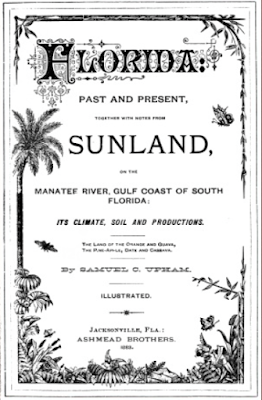 |
| Samuel C. Upham wrote this in 1881. Source: Project Gutenberg |
Surprise! Upham was, among other things, a counterfeiter of Confederate currency during the Civil War. Conspiracy theorists debate whether he was simply an opportunist, or a Union agent trying to make Confederate currency unstable by flooding the market.
To learn more about his wartime endeavors, check his Wikipedia profile and this 2012 New York Times blog post. An engraving of his face can be seen there.
In Florida, Upham used his promotional skills to publicize the Manatee River region. His booklet comprised several pages of text, a section of meteorological tables, and another section of ads.
He noted that, at first, he cheerfully replied to questions he received via letters. But he got tired of people making the same inquiries: "... the novelty has worn off, and the task has become slightly monotonous." So he included a Q&A section to address common concerns.
That didn't stop him from playing with correspondents, particularly those he many not have deemed worthy. One man wrote and said the 1880 U.S. Census recorded no deaths in the Manatee area. Do people ever die there, the correspondent from Utah asked. Upham's reply: "I wrote immediately, 'Hardly ever. We want to start a grave-yard, we kill a man.' " That might be humorous in its ridiculousness. But Upham had an unethical agenda. He wrote that he believed, after reading the answer, the Mormon correspondent wouldn't consider settling in Florida.
He provides serious answers to most of the questions, which address things such as the number of lightning strikes, prevalence of venomous reptiles, cost of land, cost of labor, health benefits of the climate, etc. On some, he can't help himself:
- Nearest town of importance: "Have no towns of 'importance' "
- On whether the summer heat is enervating: "That depends on a man's constitution. If born tired, yes."
- On whether insects are more troublesome than in the North: "Fleas sometimes make it lively with us."
Like every other Florida promoter, Upham vigorously extolled the region's virtues and, in my opinion, stretched the truth at times. In his Q&A, he claimed he'd never seen a day too hot to work outdoors. We're already deep into Florida summer weather as a I write this, so I cheerfully disagree.
Pioneer Florida was a land of extremes, in people as well as in climate. Upham was spot on in his answer to a question about the character of people in the area. It was mixed, he replied. He could have been speaking about himself.

